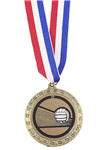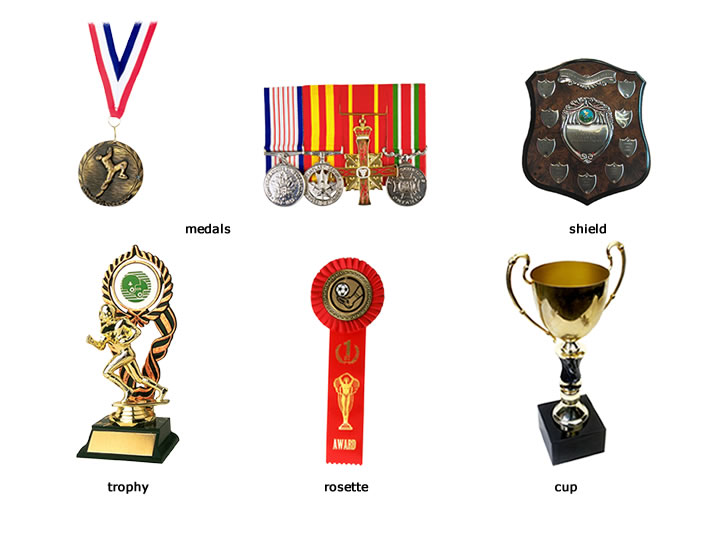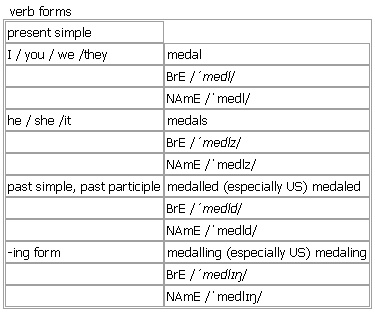|
Từ điển Oxford Advanced Learner 8th
 medal
medal

medal [medal medals] noun, verb BrE [ˈmedl] NAmE [ˈmedl]
noun 
a flat piece of metal, usually shaped like a coin, that is given to the winner of a competition or to sb who has been brave, for example in war
•to win a gold medal in the Olympics
•to award a medal for bravery
see deserve a medal at ↑deserve
Word Origin:
late 16th cent.: from French médaille, from Italian medaglia, from medieval Latin medalia ‘half a denarius’ (ancient Roman silver coin), from Latin medialis ‘medial’.
Culture:
medals
The highest decoration (= award) that can be awarded to a British person is the ↑Victoria Cross (VC), which is given to members of the armed forces ‚for conspicuous bravery in the face of the enemy’. It is a bronze cross decorated with a lion and the words ‚For Valour’, which is hung from a crimson ribbon. The Victoria Cross was introduced by Queen ↑Victoria in 1856, during the ↑Crimean War. It is reserved for acts of the greatest courage and is often awarded posthumously (= to a person who died as a result of their brave action).
The highest decoration for members of the public is the ↑George Cross (GC), which is also awarded for bravery in great danger. It is a silver cross decorated with St George and the Dragon and the words ‚For Gallantry’, and is hung from a dark blue ribbon. It was introduced by ↑George VI in 1940.
Other highly valued decorations include the Distinguished Service Cross, the Military Cross and the George Medal. There are also medals for acts of bravery by police officers and by members of the firefighting, lifeboat and coastguard services.
The US also has many medals for military and civilian achievements. The ↑Medal of Honor (MH), often called the Congressional Medal of Honor, is the highest military award and is given for ‚the risk of life, above and beyond the call of duty’. It is a star that hangs from a blue ribbon which is decorated with 13 white stars. It was created in 1862 during the Civil War, and by 2004 more than 3 450 had been awarded. Another well-known military medal is the ↑Purple Heart (PH), which is awarded to Americans wounded in wars. George ↑Washington introduced it in 1782 as the Badge of Military Merit, and the medal today has a ribbon above a purple heart with Washington’s image on it. Other important military awards include the Distinguished Service Cross and the Bronze Star.
The highest US civilian award is the Presidential Medal of Freedom, established in 1945 as the Medal of Freedom. It was originally for military service, but President ↑Kennedy changed this and also its name. The Congressional Gold Medal is also for civilians. The first was awarded in 1776 to George Washington; in 2003 one was awarded to the British Prime Minister, Tony Blair. The Carnegie Medal, another honour for civilians, is given to people who have saved, or tried to save, somebody’s life. On the medal is a sentence from the Bible: ‚Greater love hath no man than this, that a man lay down his life for his friends.’.
Example Bank:
•A commemorative medal was struck in honour of the event.
•He is a major medal hope for Britain.
•He won a gold medal in the 100 metres.
•Her medal hopes were dashed by injury.
•She deserves a medal for putting up with him.
•a medal for bravery
•Anyone who does that job deserves a medal!
•He received a medal for his service in the war.
•She is one of our best hopes for an Olympic medal.
•She won the gold medal at the World Championships.
•That brings Britain's medal haul to six— two golds, three silvers and a bronze.
verb (-ll-, especially US -l-)intransitive
to win a ↑medal in a competition
•Evans has medalled at several international events.
Verb forms: 
Word Origin:
late 16th cent.: from French médaille, from Italian medaglia, from medieval Latin medalia ‘half a denarius’ (ancient Roman silver coin), from Latin medialis ‘medial’.
|
|
|
▼ Từ liên quan / Related words
Related search result for "medal"
|
|
